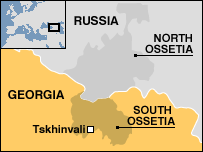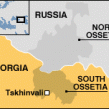
ALTERNATIVE SOUTH OSSETIAN LEADER INAUGURATED
Publication: Eurasia Daily Monitor Volume: 3 Issue: 223
By:

On December 1 Dmitry Sanakoyev was inaugurated as alternative South Ossetian leader and announced the formation of an alternative local administration in Georgian and mixed Ossetian-Georgian areas of South Ossetia. Sanakoyev and his Union for the National Salvation of Ossetians (UNSO) enjoy support also in the native villages that are currently under secessionist and Russian control.
Sanakoyev was elected on November 12 when parallel referendums and “presidential” elections were held in South Ossetia by the Moscow-installed authorities and the Tbilisi-backed UNSO, respectively. While one side reelected Eduard Kokoiti as “president” and approved “independence” from Georgia, implying eventual incorporation into Russia, the other side elected Sanakoyev as alternative president and approved the proposition that South Ossetia should hold talks with Tbilisi and form part of a federalized Georgia (see EDM, November 15, 17).
At the inaugural ceremonies in the Georgian-controlled village of Kurta, Sanakoyev took an oath to promote the interests of the people of South Ossetia, their peace, prosperity, and ethnic revival, as well as the unity of the Georgian and Ossetian peoples. He called, as he had during the election campaign, for South Ossetia to become a self-governing republic within Georgia, implying an upgrade from its pre-1990 autonomous-region status. Sanakoyev took a “presidential” oath while standing in front of the flags of the United States, the European Union, and Georgia. The parallel authorities fly Ossetian and Georgian flags side by side, whereas the secessionist authorities fly Ossetian and Russian flags.
The parallel authorities have designated the brothers Uruzmag Karkusov and Jemal Karkusov for “prime minister” and “interior minister,” respectively. Jemal, formerly a secessionist “interior minister,” turned against the Moscow-backed leaders, was jailed for six months in 2005 in Tskhinvali, and escaped with the assistance of Georgia’s Internal Affairs Ministry. The new authorities also opened a local branch of the Tbilisi-backed channel Alania TV in Kurta. This move should break the Russian media’s information monopoly in South Ossetia. Dmitry Sanakoyev’s brother, Vladimir, hosts the channel’s news and commentary program in Russian.
The Sanakoyevs and Karkusovs are among the Ossetian extended families within the secessionist-controlled territory that had been relatively amenable to accommodation with Tbilisi and were displaced from positions of influence in the last few years by the pro-Moscow hardliners. On the eve of his inauguration, Dmitry Sanakoyev asked Russian President Vladimir Putin on live television to “put an end to the criminal activities of Russia’s citizens [who rule] in Tskhinvali.” Among these he singled out “prime minister” Yuri Morozov, “defense minister” General Anatoly Barankevich, and KGB (still so-named) chief Boris Atoyev, all of whom were sent in from Moscow. These officials and their retinues exemplify the marginalization of local leaders and interests by Moscow-appointed leaders and Russian interests. At the moment, Morozov is chairing a commission empowered to screen candidates for posts in the Tskhinvali authorities.
Sanakoyev also appealed to Georgian President Mikheil Saakashvili to exercise his constitutional powers and responsibilities in promoting peaceful conditions, law and order, and the rights and security of the people of South Ossetia. All of the main Georgian television channels reported Sanakoyev’s inauguration extensively. Georgian State Minister for Conflict Resolution Merab Antadze and several parliamentary deputies were present during the inaugural ceremonies.
The alternative president and Tbilisi are making clear that they will seek a seat for the South Ossetian parallel authorities on the Joint Control Commission (JCC), the ceasefire-and “peacekeeping”-supervision body that includes Russia, Russia’s North Ossetia, South Ossetia, and Georgia as members and the OSCE as observer. Tskhinvali promptly rejected any role for the parallel authorities in the JCC or any innovation that would undermine the “existing format.”
According to Antadze, Tbilisi will hold talks with any force that expresses the local population’s interests. It will continue the dialogue with the secessionist authorities while also engaging with the parallel authorities. Tbilisi does not regard either the Tskhinvali authorities or the parallel ones as legitimate, but it points out that the situation has significantly changed: Two sets of de facto authorities now operate in South Ossetia and will compete for the population’s support.
The Georgian parliament plans to begin enacting a Law on Restitution by the end of this year. The law will restore and protect the property rights of those Ossetians who were forced to abandon their homes or had property confiscated from them during the fighting of 1990-92. It will apply to Ossetians and Georgians from South Ossetia as well as to Ossetian refugees from Georgia’s interior districts (this category outnumbers the refugees of either ethnicity from South Ossetia itself).
The alternative “president” and emergent parallel administration in South Ossetia constitute a new political force that is creating a new reality on the ground. A duality of power is developing there, as it might also in Abkhazia following the return of Georgian authorities to the upper Kodori Valley. Hence, Russia will redouble efforts to preserve its clients’ monopoly of power and representation. However, pro-Moscow authorities can no longer lay claim to exclusive representation of local populations, and Moscow itself can no longer sustain the Soviet-type myth of “unanimity” on behalf of the secessionist option. The new situation on the ground opens the way for the first time to competitive political outlooks and diversification of information in these hitherto isolated enclaves.
(Kavkaz-Press, Rustavi-2 and Imedi television, Civil Georgia, Itar-Tass, South Ossetian Press and Information Committee, November 29-December 3)




